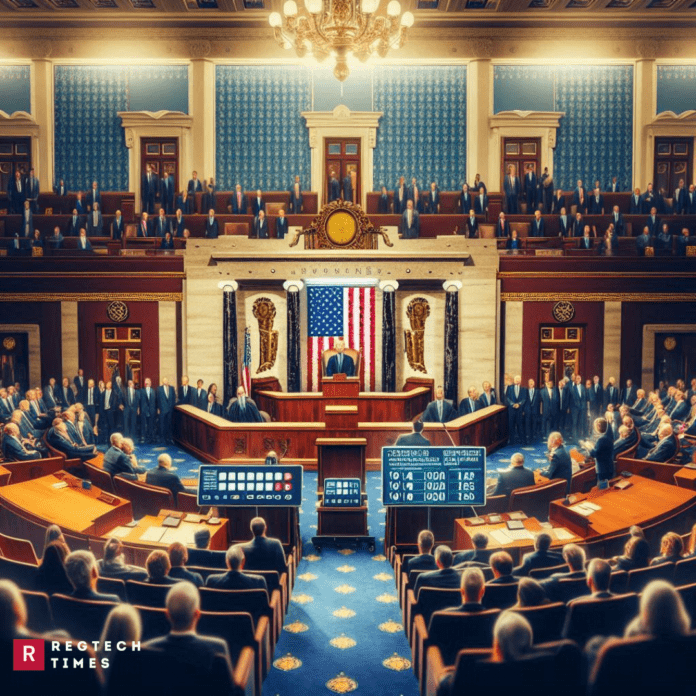US House Approves Sanctions Against ICC
A bill that imposed severe sanctions on the International Criminal Court (ICC) was approved by the US House of Representatives on January 10. This legislative action comes in response to the court’s issuance of arrest warrants against Israeli leaders, accusing them of committing war crimes in the ongoing Gaza conflict. The “Illegitimate Court Counteraction Act,” as it was called, received strong bipartisan support, with 140 MPs voting against it and 243 in favor.
The bill’s provisions aim to penalize any individual or organization that collaborates with the ICC in its investigations or legal actions against US citizens or citizens of allied nations. These sanctions would freeze assets, block financial transactions, and deny visas to those involved in aiding the court’s activities. The goal is to protect US allies, such as Israel, from what lawmakers describe as unjustified and politically motivated actions by the ICC.
The House’s decision underscores the US government’s strong stance against the ICC’s interference in matters involving its allies. The bill is now on its way to the Senate, where a swift assessment is anticipated.
ICC’s Arrest Warrants and Jurisdiction
The ICC, headquartered in The Hague, Netherlands, is a permanent international tribunal responsible for prosecuting individuals accused of war crimes, crimes against humanity, and genocide. It has jurisdiction over crimes committed within member states, even if the accused are citizens of non-member nations. This legal basis allowed the ICC in May 2023 to issue arrest warrants against two senior Israeli leaders for alleged war crimes linked to military operations in Gaza.
The allegations against these leaders arise from years of conflict in Gaza, marked by extensive destruction and significant civilian casualties. While the ICC asserts that its investigations aim to ensure accountability for international law violations, Israel, which is not a member of the court, has dismissed its jurisdiction and accused the tribunal of bias. Meanwhile, Palestine, a member of the ICC since 2015, has supported investigations into alleged war crimes involving both Israeli and Hamas officials.
The US has similarly voiced concerns about the ICC’s probes into its military actions in Afghanistan and its allies’ activities in Palestinian territories. These concerns have driven legislative measures to challenge the ICC’s influence, aiming to shield US citizens and allied nations from legal actions under its mandate.
The Larger Debate Over International Justice
The “Illegitimate Court Counteraction Act” highlights the ongoing animosity between the US and the international tribunal. This bill renews efforts to challenge its authority, with proponents arguing that the court undermines national sovereignty and unfairly targets allies like Israel. Supporters claim the court oversteps its mandate, prosecuting individuals from nations that do not recognize its jurisdiction. The proposed sanctions, including freezing assets and denying visas, aim to deter collaboration and protect US interests from what lawmakers perceive as politically motivated investigations.
Critics, however, warn that the legislation undermines the tribunal’s independence and global accountability efforts. Human rights advocates argue that such actions set a harmful precedent, allowing powerful nations to evade scrutiny for alleged war crimes. Despite this criticism, the bill is expected to pass in the Senate, given its bipartisan support and alignment with broader US efforts to shield its allies from international legal actions.
ICC’s Global Role
The ICC was established in 2002 to ensure justice for victims of the most severe crimes, such as genocide, war crimes, and crimes against humanity. It was established to deal with cases in which national courts are incapable or unwilling to bring criminal charges against perpetrators. Despite its noble goals, the court has faced criticism for its perceived bias and uneven application of justice.
While some countries, including the United States, Israel, and Russia, are not members of the International Criminal Court (ICC), the court retains jurisdiction over crimes committed in member states. This has led to investigations involving non-member nations, sparking international disputes.
The US has occasionally supported the court’s actions, such as when an arrest warrant was sought for Russia’s president over alleged war crimes in Ukraine. However, this selective support highlights the complexities of international justice, where geopolitical interests often influence the stance of powerful nations.
The ongoing debate over the court’s role and authority underscores the challenges of enforcing international law in a world divided by competing political and national interests. The US House’s recent decision adds another chapter to this contentious relationship, as nations grapple with the balance between sovereignty and global accountability.


